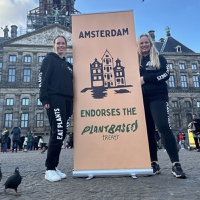From foodingredientsfirst.com
08 Feb 2024 --- Amsterdam, the Netherlands, has become the first EU capital to endorse the call for a Plant Based Treaty to address food system impacts on the climate crisis, aiming to make the city a vegan capital. Implementing its plant-based plans, included in its Food Strategy 2024-2026 for healthy, fair and sustainable food, should start in early 2026 at the latest.
Launched in 2021, the Plant Based Treaty was developed as a companion to the 2015 Paris Agreement on climate change. It aims to halt the degradation of critical ecosystems caused by animal agriculture, promoting a shift to healthier, sustainable plant-based diets. Amsterdam is the 25th municipality to endorse the treaty worldwide.
Nutrition Insight meets up with two professionals from the Plant Based Treaty — Lisette Weustenenk, campaign coordinator for the Netherlands, and Lea Goodett, campaign coordinator for Europe, to discuss the treaty’s implications and see how it may be implemented in the city.
“Amsterdam has become the first EU capital to call for a global Plant Based Treaty to address food system impacts on the climate emergency. As well as the call for a Plant Based Treaty, Amsterdam is taking a leading role in the protein transition,” they tell us.
“A motion tabled by the Party for the Animals, which aims to make Amsterdam a ‘Plant Based Capital,’ was adopted. The city will enter a covenant with major employers, public institutions such as hospitals, community centres and care institutions in Amsterdam titled ‘Amsterdam: healthy, fair and sustainable food city.’”
(All images credit: Plant Based Treaty)Weustenenk and Goodett highlight several elements that such a plant-based covenant may include, such as enabling all employees, visitors and patients to obtain entirely plant-based meal options in publicly funded institutions from 2024 onwards.
Moreover, the city aims for all restoration and catering at public institutions to commit to a “Vegan Friday” starting in 2024. It further wants these institutions to commit to the animal-plant protein ratio set in the city by 2030. It may also organize an annual plant-based conference with care institutions, schools, universities and other public institutions in Amsterdam.
Healthy and sustainable F&B
In a statement, the City of Amsterdam Council says that food production, distribution, processing and consumption significantly impacts the health of people and animals, contributing to the climate crisis. With its food strategy, the municipality aims to drive changes in the food system to ensure all residents have access to healthy, sustainable and affordable food and drinks.
“One effort to achieve this is the shift toward more plant-based food,” reads the statement. “The consumption of more plant-based proteins is better for our health. It can lead to fewer conditions such as cardiovascular diseases and colorectal cancer.”
The statement further adds that a shift to plant-based foods helps reduce greenhouse gas emissions and decrease land use and the depletion of oceans. “The ambition is to shift the protein ratio in the city’s diet from 40% to 60% plant-based by 2030.”
 By signing the treaty, the organization also asks businesses and institutions to make plant-based options more accessibleWeustenenk and Goodett highlight that whole food plant-based diets are nutritionally adequate and may provide health benefits in preventing certain diseases, according to the American Dietetic Association.
By signing the treaty, the organization also asks businesses and institutions to make plant-based options more accessibleWeustenenk and Goodett highlight that whole food plant-based diets are nutritionally adequate and may provide health benefits in preventing certain diseases, according to the American Dietetic Association.
“Vegan diets are richer in fibre and antioxidants. They don’t contain cholesterol and are generally less rich in saturated fats. People following a vegan diet generally have a healthier weight and a lower chance of developing diabetes type 2, heart disease and certain types of cancer.”
The latest research links higher plant-based protein intake to healthier aging in women. At the same time, experts highlight that replacing animal products with vegan options supports weight loss, reduced cholesterol, reduced fat intake and increased fibre intake in overweight adults.
Meanwhile, the UK non-profit Veganuary spotlights a growing interest in vegan diets, partly driven by an increased availability of good vegan food.
Time for a Plant Based Treaty
Weustenenk and Goodett underscore the need for such a treaty in light of the current climate, ocean and biodiversity crises. Furthermore, they state that fossil fuels and animal agriculture drive global warming, leading to “extensive biodiversity loss, large-scale deforestation, species extinction, water depletion, soil degradation and ocean dead zones.”
“Addressing fossil fuels alone is not enough — we need action on food systems too; that’s where the Plant Based Treaty comes in. The three main greenhouse gasses, carbon dioxide, methane and nitrous oxide, are at record levels and rapidly accelerating. Animal agriculture contributes to all three but is the main driver of global methane and nitrous oxide emissions.”
They add that signing the Plant Based Treaty involves more than a signature. “We ask businesses and institutions to lead by example and to implement meaningful changes like menu changes and making plant-based options more accessible for people.”
Goodett calls on more cities to sign up for the treaty to address food system impacts on the climate emergency, adding that plant-based food initiatives will make the products accessible for all, improve health and strengthen food security. “Everyone can participate by emailing their city council inviting them to follow Amsterdam’s great example.”
Both experts conclude: “The Plant Based Treaty aims to garner more city endorsements across the Netherlands and the rest of the EU, with appropriate actions attached, like the motions that Amsterdam has put forth. A great example is the stimulation of vegan Fridays and plant-based options in public restaurants.”

No comments:
Post a Comment